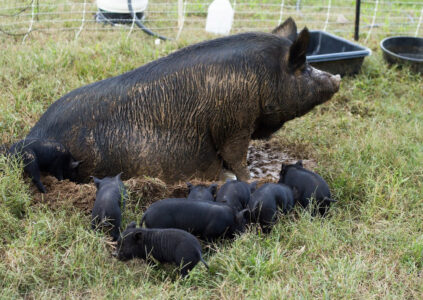Learn about the docile temperament of American heritage guinea hogs and their foraging habits, and help preserve them by promoting breed awareness.
Rare livestock breeds are at a tipping point, and what we do at this juncture is important. Each individual animal, as well as the overall herd, holds unique genetic information. Once lost, those breeds can’t be recovered. One such breed is the American Guinea Hog, or Guinea Hog — a landrace breed native to the United States and uniquely suited to farmsteads and small landholders, with a deep connection to Southern history and culture.
When I called former Guinea Hog breeder Bill Biggers in August 2017, I told him I was writing a history of the breed. He asked, “The forest pig?” I had to remember that he’d sold Arthur, one of the 12 foundation hogs documented by the American Guinea Hog Association, many years ago. At that time, the name “American Guinea Hog” had yet to be conceived. Guinea Hogs had many other names prior to the foundation of the American Guinea Hog Association in 2006, including “African Guinea Hog” and “Guinea Forest Hog” — sometimes as a result of confusion over the breed’s origins.
Earlier on the day I phoned Bill, my friend Matt Hunker had emailed me an article from the Daily Press. It was first published in The Roanoke Times on May 2, 2005. The article, written by Pamela J. Podger, was titled “A Morsel of History: Rare Hog Charms Park Visitors.” The story featured Louise, a very friendly “Guinea Forest Hog,” and Louise’s owner, Bill Biggers. It documented Louise’s time as a “hog ambassador” in Virginia at events on Belle Grove Plantation in 1998 and in Pamplin Historical Park in 2003.
Finding that gem of an article helped me identify Biggers’ location and age, which helped me find his contact information online. After a little sleuthing, we became friends on Facebook. Soon, I was speaking with him on the phone.
Arthur’s Unknown Origins
William “Bill” Biggers was born in 1941 and lives in Virginia. He’s an avid caver or spelunker. While talking on the phone, he told me that he’d acquired three Guinea Hogs — Arthur, Louise, and Gladys — “from a fellow over in Maryland, close to St. Mary’s, around 1998.” He’d picked up his first breeding pair, Punch and Judy, in Stanton, Ohio, the year before. He admitted that he didn’t remember all of the details surrounding the acquisitions. “I don’t keep records really good, and I’m sorry about that. But I can tell you everything I remember,” he said. (I try to verify the accuracy of stories whenever possible. Memories can be tricky, but each memory may hold some elements of truth.)

According to Biggers, he sold Arthur to Don Oberdorfer, a founding member of the American Guinea Hog Association, around 2004. “When I got Arthur from Bill Biggers, he had two boars,” Oberdorfer says. “One had a little white on the leg, and he had Arthur, that I bought. And Bill said to me, ‘Well, do you want a pure Guinea or one with something else in it?’ And I said, ‘Well, if I’m going to get started in the breeding, I’d better have a pure one.’ ”
Oberdorfer says Biggers couldn’t recall at the time where he’d acquired Arthur, but Biggers’ wife said they got the hog from the Roger Williams Park Zoo in Rhode Island, and that he rode home in her lap. “And I’m pretty sure that he knew that,” Oberdorfer says. “But, you know, he wasn’t lying. It’s just that nobody paid that much attention or cared that much.”
I dug a little deeper into the mystery to see whether I could resolve the discrepancy between the memories of Arthur’s acquisition. I eventually tracked down Tim French, who was the deputy director of animal operations at the Roger Williams Park Zoo. Tim replied to me with the following email:
“Dr. Payne, your request for information about Guinea Hogs that may have been sent out from Roger Williams Park Zoo was forwarded to me. I checked our records going back to 1970. We only had four Guinea Hogs in that time. A pair purchased in 1992, and two females acquired from Beardsley Park Zoo in Connecticut in 2009. The 1992 animals died in 2000 and 2009. We still have one of the females acquired in 2009. The other died in 2016. There have never been any Guinea Hog births at the zoo. The couple you referred to in your inquiry must have gotten their hogs from someplace else.”
When I followed up with Biggers, he maintained his wife’s story that Arthur came from the Roger Williams Park Zoo. Perhaps he came from somewhere in Maryland, as originally stated. His origin is, unfortunately, not definitively known, though he’d go on to become one of the foundation stock for the breed. (Visit the American Guinea Hog website to learn more about the breed registry).
Laid-Back Louise
At one time, Biggers had 52 guinea hogs, descended from his original five animals. One of the things that drew him to the breed was its reputation for grazing instead of rooting. He kept them on 17 acres.
Louise, one of the five original hogs, was popular with the press and at local parks. “We were down there [at Sand Point Park], and that’s when she got the reputation for loving music,” Biggers says. “The banjo picker was tuning up his banjo in the morning. He went down there and started picking, and Louise started singing with him. She was keeping time right along with him.”
According to Biggers, he loved keeping Guinea Hogs because they have gentle personalities and are easy to move, even the boars. “The African guinea hogs are very laid-back,” he says. “When Louise was having piglets, she would let me come in there and touch them almost right after they were born. … The worst thing they did was get out underneath the fence, and they would go over and tear up a guy’s flower bed. I replaced a lot of flowers.”

Biggers also attested to the animals’ intelligence and lovable personalities. “Louise was down in Rowan Oak Park, and they had a school group come in,” he says. “The guy told them to stay back away from her mud hole, which was right next to the fence. He watched them, but nobody believed him, and they all came up next to the fence. She had piglets with her because she gave birth at the park. The guy saw her look over, and the next thing she does is trot straight to the mud hole and flop herself into that mud. It just took up a geyser of water that went right over the fence. Got every one of them, school kids. Then, she rolled a couple of times and then got out of the water hole and went back to her piglets. She knew what she was doing.”
Unfortunately, Louise was gored by a Devon bull and died in 2007.
Preserving Bloodlines of Heritage Guinea Hogs
Coat type varies among Guinea Hogs, and the animals may have bristles that are soft or stiff, coats that are thin or thick, and hair that’s wavy or straight. After looking at pedigrees, my theory for a while was that Arthur (registered “Biggers Arthur”) was the shared foundation animal carrying the trait for curly hair within the breed. In my herd, I had a curly-haired sow whose parents were great-great-grandchildren of Arthur. Each of them had him in their pedigrees four times. My experience with my sow LSF Bess was that in each of her litters, some offspring would develop curly or wavy hair by 8 months old, and some would have straight hair. All of them had thick, long hair and a large, rounded frame. Their noses were on the short side, and the hogs tended to be big-boned. The boars were docile and loved belly rubs. My interview with Biggers confirmed that his herd carried similar traits.

According to Oberdorfer, Arthur had large shoulders and narrow hips, “almost like a cartoon bulldog.” He also said that Arthur and his son, DNC Junior, were independent and liked to be scratched. “Arthur was also a bit snufflier,” Oberdorfer says. “Sort of like a bulldog, but he would do that in a good way when you scratched his ears.”
Pedigrees that include Guinea Hogs, VAZ John Henry, and VAZ Harriet will be linebred to carry traits of Biggers Arthur. I linebred my LSF Bess to one of her sons in order to bring Arthur’s genetics up to 25 percent in the offspring I selected from that litter. That boar is BRP Sonny Boy Williamson, the cover boar for my book Saving the Guinea Hogs. He has quite the curly coat and is full of personality.
I have high hopes for the future of American Guinea Hogs. They’re wonderful, thrifty, vigorous, and gentle animals that are full of personality. They’re easy to love and easy to handle. They also provide delicious pork and lard. (Bill belongs to a group of cavers who have acreage in Deerfield, Virginia, where they hold festivals. Bill liked to bring whole hogs to these events for everyone to enjoy as barbecue.) I hope many others will pick up the torch of preserving this breed. Guinea Hogs are an important part of American culture, and with your help, they’ll continue to not only survive but also thrive for many decades to come.
Excerpted from the award-winning book Saving the Guinea Hogs: The Recovery of an American Homestead Breed by Cathy R. Payne (Rose Garden Press). Learn more at www.GuineaHogBooks.com, and get in touch by emailing GuineaHogBooks@Gmail.com.







